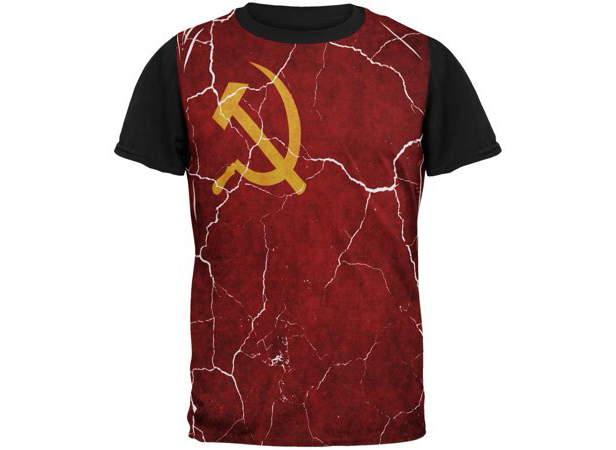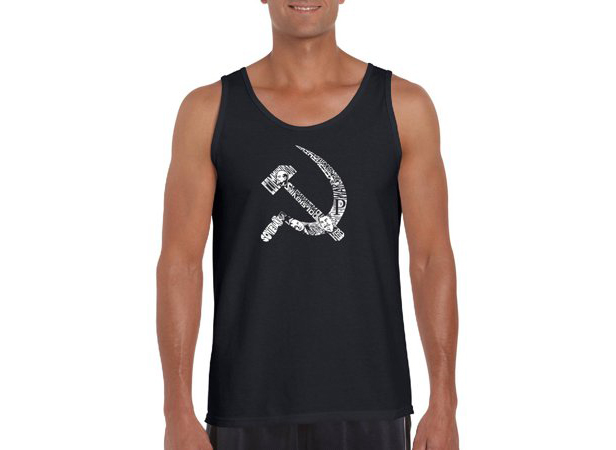September 24, 2018
Walmart Pledges To Pull Soviet T-Shirts After ‘Eastern Bloc’ Outcry
Still, it appeared some Soviet-themed tees were available online early Monday.
Logoed T-Shirts are lightweight, but depending on the symbol they bear, they can carry a massive burden of politics, history and pain.
The truth of that was again evident last week when Walmart said it would stop selling imprinted tees that bore symbols representative of the former Soviet Union. Retailed in Walmart’s online shop, the hammer-and-sickle T-Shirts were the subject of criticism from officials in Estonia, Lithuania and Latvia. The three former Eastern Bloc countries were forcibly annexed to the Soviet Union in 1940, and suffered under communist rule until the regime’s collapse in 1991.
Baltic states blast Walmart over Soviet-themed shirts https://t.co/WEH31kl3S7
— BalticStatesXYZ (@BalticStatesXYZ) September 18, 2018
Lithuania led the criticism. After learning of the T-Shirts, the Lithuanian ambassador to the United States, Rolandas Krisciunas, wrote Walmart asking the company to pull the tees. Krisciunas said that “horrific crimes were done under the Soviet symbols of a sickle and hammer,” and “the promotion of such symbols resonates with a big pain for many centuries.”
Lithuania’s Ambassador’s in the US @RolandasKr open letter to @Walmart: Horrific crimes were committed under the Soviet symbols of a sickle-and-hammer. We trust on Walmart to withdraw the T-shirts and other products with USSR symbols. pic.twitter.com/6cQeUHKE1f
— LT MFA STRATCOM (@LT_MFA_Stratcom) September 6, 2018
Similarly, the Lithuanian Foreign Ministry equated selling the hammer-and-sickle shirts with selling tees with Nazi symbols. In Lithuania, Communist-era imagery, including the hammer-and-sickle, is banned. According to Lithuanian officials, Soviet rule left hundreds of thousands of Lithuanians dead or exiled.
Soviet leader Joseph Stalin ordered the deportation of more than 275,000 #Lithuania|ns to Siberia between 1940-1952. According to the Lithuanian genocide and resistance research centre, a further 21,000 were killed in armed resistance. @LTembassyUShttps://t.co/Uwf5Wbk991
— Lithuania MFA (@LithuaniaMFA) September 19, 2018
Ultimately, Walmart decided to pull the T-Shirts from its online marketplace – a move that drew praise from officials in Lithuania.
US retail giant @Walmart tells #Lithuania|n ambassador 🇺🇸 @RolandasKr it will stop selling products with Soviet hammer and sickle symbols after criticism from 🇱🇹🇱🇻🇪🇪. Via @BNSLithuania https://t.co/Kvh6op0Rsg
— Lithuania MFA (@LithuaniaMFA) September 18, 2018
While media reports indicated that no Soviet shirts were for sale on Walmart.com as of late last week, it appeared some possible third-party sellers had managed to get Soviet-themed tees back on the platform by Monday Sept. 24. A search for “Soviet” shortly before midday turned up a number of Soviet-themed shirts that included the below:

An example of a Soviet-themed tee that was available early Monday from third party-seller “Old Glory” on Walmart.com.

A Soviet-themed tank top that was available early Monday.
Russia did not remain silent during the initial controversy surrounding the T-Shirts. Indeed, the nation’s Ministry of Foreign Affairs took a swipe at Lithuania over the outcry.
Congratulations on your victory, in the important matter of t-shirts. We expect you to show the same determination and efficiency in fighting the demolition of WW2 monuments in Europe to Soviet soldiers who saved millions of innocent people, while sacrificing their own lives
— MFA Russia 🇷🇺 (@mfa_russia) September 19, 2018
But, out of interest. Which is worse? Selling t-shirts representing the state which liberated Europe from Hitler or naming a school after a Nazi stooge? pic.twitter.com/Ce7nxpBIVD
— MFA Russia 🇷🇺 (@mfa_russia) September 19, 2018
The whole situation raises interesting questions and reflections. Under free speech ideals, for example, are Walmart and others within their rights to sell any T-Shirts they desire, no matter how controversial the symbols the shirts display? Or, are there some symbols – like the swastika perhaps – that should be retired for good/outright banned? Maybe, for some, it does not involve principles at all. Rather, perhaps it all comes down to a matter of practical (Machiavellian?) commerce: If a symbol is popular in one place, sell tees bearing it there. If it’s reviled in other spots, don’t sell the tees in those locations. The considerations could go on. But one thing seems certain: Sometimes, history’s competing narratives clash in the symbols of T-Shirts, and the pains of the past roar from screen-printed ink into the present.

Product Hub
Find the latest in quality products, must-know trends and fresh ideas for upcoming end-buyer campaigns.